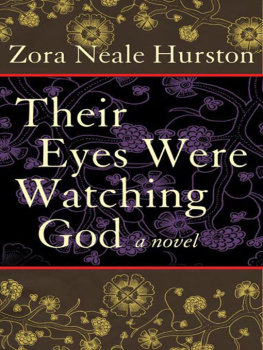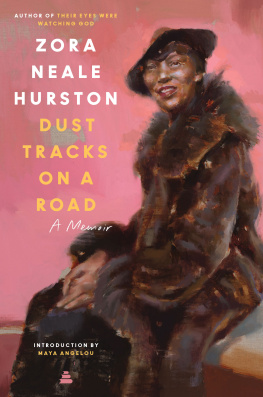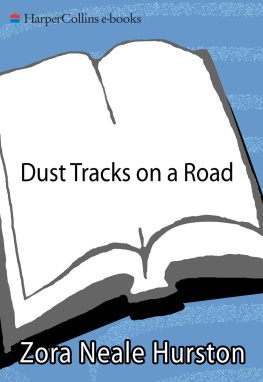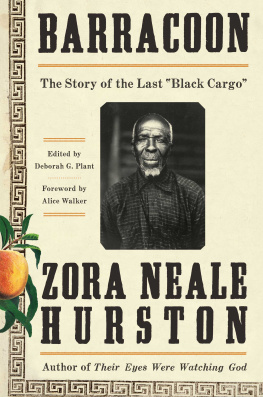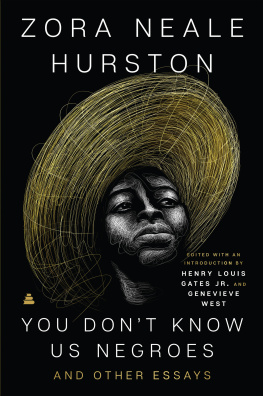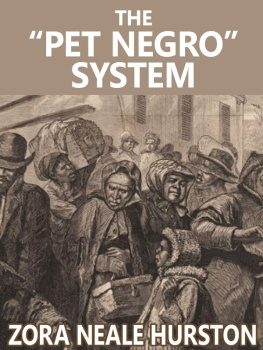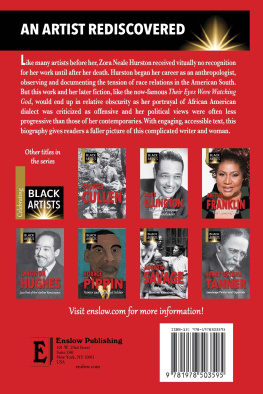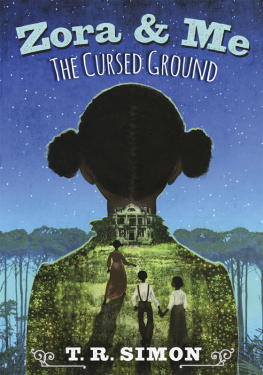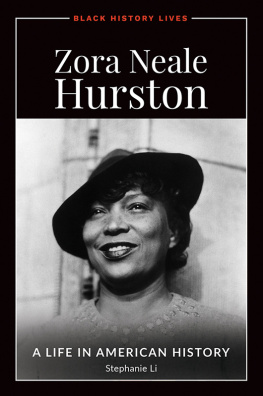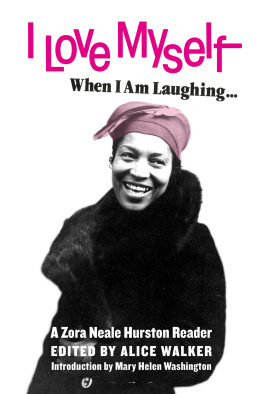Zora Neale Hurston - Their Eyes Were Watching God
Here you can read online Zora Neale Hurston - Their Eyes Were Watching God full text of the book (entire story) in english for free. Download pdf and epub, get meaning, cover and reviews about this ebook. year: 2004, publisher: HarperCollins, genre: Detective and thriller. Description of the work, (preface) as well as reviews are available. Best literature library LitArk.com created for fans of good reading and offers a wide selection of genres:
Romance novel
Science fiction
Adventure
Detective
Science
History
Home and family
Prose
Art
Politics
Computer
Non-fiction
Religion
Business
Children
Humor
Choose a favorite category and find really read worthwhile books. Enjoy immersion in the world of imagination, feel the emotions of the characters or learn something new for yourself, make an fascinating discovery.
- Book:Their Eyes Were Watching God
- Author:
- Publisher:HarperCollins
- Genre:
- Year:2004
- Rating:4 / 5
- Favourites:Add to favourites
- Your mark:
- 80
- 1
- 2
- 3
- 4
- 5
Their Eyes Were Watching God: summary, description and annotation
We offer to read an annotation, description, summary or preface (depends on what the author of the book "Their Eyes Were Watching God" wrote himself). If you haven't found the necessary information about the book — write in the comments, we will try to find it.
Their Eyes Were Watching God — read online for free the complete book (whole text) full work
Below is the text of the book, divided by pages. System saving the place of the last page read, allows you to conveniently read the book "Their Eyes Were Watching God" online for free, without having to search again every time where you left off. Put a bookmark, and you can go to the page where you finished reading at any time.
Font size:
Interval:
Bookmark:
ZORA NEALE HURSTON
Eyes Were
Watching God
With a Foreword by Edwidge Danticat

T o H enry A llen M oe
Janies Great Journey: A Reading Group Guide
Ships at a distance have every mans wish on board.
Janie saw her life like a great tree in leaf
There are years that ask questions and years that answer.
Long before the year was up, Janie noticed that her
On the train the next day, Joe didnt make many
Every morning the world flung itself over and exposed the
The years took all the fight out of Janies face.
After that night Jody moved his things and slept in
Joes funeral was the finest thing Orange County had ever
One day Hezekiah asked off from work to go off
Janie wanted to ask Hezekiah about Tea Cake, but she
It was after the picnic that the town began to
Jacksonville. Tea Cakes letter had said Jacksonville. He had worked
To Janies strange eyes, everything in the Everglades was big
Janie learned what it felt like to be jealous. A
The season closed and people went away like they had
A great deal of the old crowd were back. But
Since Tea Cake and Janie had friended with the Bahaman
And then again Him-with-the-square-toes had gone
Because they really loved Janie just a little less than
by Zora Neale Hurston
In her award-winning autobiography, Dust Tracks on a Road (1942), Zora Neale Hurston claimed to have been born in Eatonville, Florida, in 1901. She was, in fact, born in Notasulga, Alabama, on January 7, 1891, the fifth child of John Hurston (farmer, carpenter, and Baptist preacher) and Lucy Ann Potts (school teacher). The author of numerous books, including Their Eyes Were Watching God , Jonahs Gourd Vine , Mules and Men , and Moses, Man of the Mountain , Hurston had achieved fame and sparked controversy as a novelist, anthropologist, outspoken essayist, lecturer, and theatrical producer during her sixty-nine years. Hurstons finest work of fiction appeared at a time when artistic and political statementswhether single sentences or book-length fictionswere peculiarly conflated. Many works of fiction were informed by purely political motives; political pronouncements frequently appeared in polished literary prose. And Hurstons own political statements, relating to racial issues or addressing national politics, did not ingratiate her with her black male contemporaries. The end result was that Their Eyes Were Watching God went out of print not long after its first appearance and remained out of print for nearly thirty years. Henry Louis Gates, Jr., has been one among many to ask: How could the recipient of two Guggenheims and the author of four novels, a dozen short stories, two musicals, two books on black mythology, dozens of essays, and a prizewinning autobiography virtually disappear from her readership for three full decades?
That question remains unanswered. The fact remains that every one of Hurstons books went quickly out of print; and it was only through the determined efforts, in the 1970s, of Alice Walker, Robert Hemenway (Hurstons biographer), Toni Cade Bambara, and other writers and scholars that all of her books are now back in print and that she has taken her rightful place in the pantheon of American authors.
In 1973, Walker, distressed that Hurstons writings had been all but forgotten, found Hurstons grave in the Garden of Heavenly Rest and installed a gravemarker. After loving and teaching her work for a number of years, Walker later reported, I could not bear that she did not have a known grave. The gravemarker now bears the words that Walker had inscribed there:
ZORA NEALE HURSTON
GENIUS OF THE SOUTH
NOVELIST FOLKLORIST ANTHROPOLOGIST
(1891-1960)
- What kind of God are the eyes of Hurstons characters watching? What is the nature of that God and of their watching? Do any of them question God?
- What is the importance of the concept of horizon? How do Janie and each of her men widen her horizons? What is the significance of the novels final sentences in this regard?
- How does Janies journeyfrom West Florida, to Eatonville, to the Evergladesrepresent her, and the novels increasing immersion in black culture and traditions? What elements of individual action and communal life characterize that immersion?
- To what extent does Janie acquire her own voice and the ability to shape her own life? How are the two related? Does Janies telling her story to Pheoby in flashback undermine her ability to tell her story directly in her own voice?
- What are the differences between the language of the men and that of Janie and the other women? How do the differences in language reflect the two groups approaches to life, power, relationships, and self-realization? How do the novels first two paragraphs point to these differences?
- In what ways does Janie conform to or diverge from the assumptions that underlie the mens attitudes toward women? How would you explain Hurstons depiction of violence toward women? Does the novel substantiate Janies statement that Sometimes God gits familiar wid us womenfolks too and talks His inside business?
- What is the importance in the novel of the signifyin and playin de dozens on the front porch of Joes store and elsewhere? What purpose do these stories, traded insults, exaggerations, and boasts have in the lives of these people? How does Janie counter them with her conjuring?
- Why is adherence to received tradition so important to nearly all the people in Janies world? How does the community deal with those who are different?
- After Joe Starkss funeral, Janie realizes that She had been getting ready for her great journey to the horizons in search of people; it was important to all the world that she should find them and they find her. Why is this important to all the world? In what ways does Janies self-awareness depend on her increased awareness of others?
- How important is Hurstons use of vernacular dialect to our understanding of Janie and the other characters and their way of life? What do speech patterns reveal about the quality of these lives and the nature of these communities? In what ways are their tongues cocked and loaded, the only real weapon of these people?
T he E state of Z ora N eale H urston would like to thank those people who have worked so hard over the years in introducing new generations of readers to the work of Zora Neale Hurston. We are indebted to Robert Hemenway, Alice Walker, and all the Modern Language Association folks who helped usher in Zoras rediscovery. We are also deeply appreciative of the hard work and support of our publisher, Cathy Hemming; our editor, Julia Serebrinsky; and our agent, Victoria Sanders, without whom this reissue would not have been possible.
S hips at a distance have every mans wish on board. S o begins Zora Neale Hurstons brilliant novel about a womans search for her authentic self and for real love. At first it might seem contradictory that a work whose central character is the remarkably resolute and resilient Janie Crawford should start with a dictum about the life of men. However, that is one of the many shrewd manifestations of Zora Neale Hurstons enormous talents: her ability to render a world complete with its codes and disciplines within a few sentences, and then placing in that world her vision of how her peoplethe women and men of her own creation, her charactersfunction, triumph, and survive. So off that metaphorically distant ship comes our heroine Janie Crawford, and suddenly we realize that she had been on her own singular journey all along, her dreams mocked to death by Time, but never totally defeated. And since women remember everything they dont want to forget, Janie Crawford recalls all the crucial moments of her life, from the time she first discovers that she is a colored little girl by searching for her face in a group photograph, to the moment she returns to Eatonville, Florida, from the Everglades, not swindled and deceived, as had been expected, but heartbroken, yet boldly defiant, after having toiled in the bean fields, survived a hurricane, and lost the man she loved.
Font size:
Interval:
Bookmark:
Similar books «Their Eyes Were Watching God»
Look at similar books to Their Eyes Were Watching God. We have selected literature similar in name and meaning in the hope of providing readers with more options to find new, interesting, not yet read works.
Discussion, reviews of the book Their Eyes Were Watching God and just readers' own opinions. Leave your comments, write what you think about the work, its meaning or the main characters. Specify what exactly you liked and what you didn't like, and why you think so.

